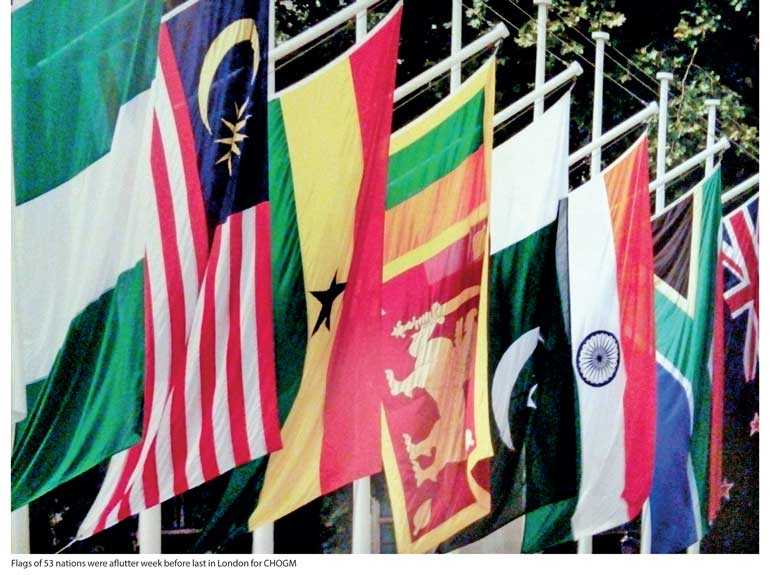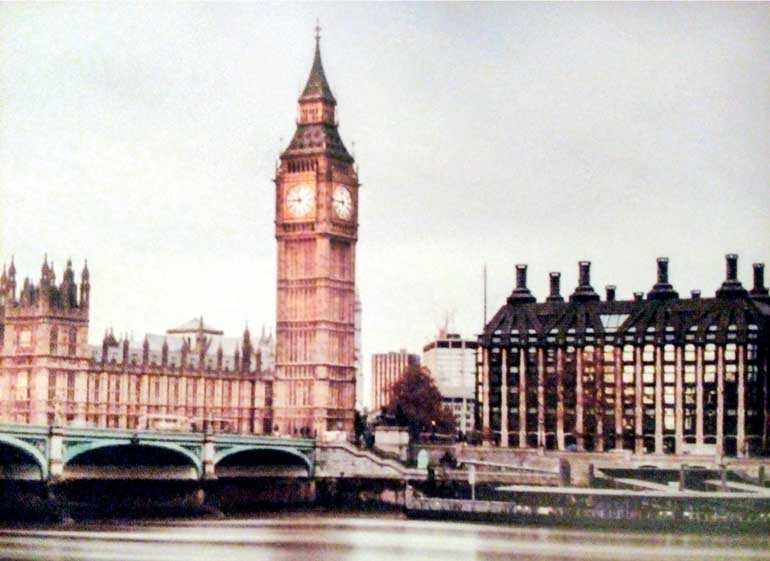Monday Feb 16, 2026
Monday Feb 16, 2026
Wednesday, 2 May 2018 00:00 - - {{hitsCtrl.values.hits}}


It was in fact by default that the United Kingdom got the chance to host the 25th Commonwealth Heads of State Meeting (CHOGM) this year held in London and successfully concluded week before last. It was at the 2015 Malta CHOGM Summit, with cyclone-hit Vanuatu informing of its inability to host the next summit, that the then UK Prime Minister David Cameron offered to host it in London.
That quirk of fate however gave the UK the advantage and tremendous opportunity to showcase itself on the world stage and seal its continuance as its head, with Prince Charles chosen to do so as the next head after Queen Elizabeth II, and also have the British Prime Minister to operate as Chair-in-Office until 2020.
Crucial times for the UK
There’s no denying that the coming months and the next two years are crucial times for the UK with Britain officially scheduled to leave the European Union at midnight on 30 March next year. For the UK the underlying backdrop, with all the pomp, pageantry and serious discussions, speeches at the CHOGM, was Brexit.
For the UK to play a greater role on the world stage, the Commonwealth appears a readymade springboard – a grouping of 53 countries, spanning six continents, conducts one-fifth of global trade and comprises of one third of the world population (40% of people under the age of 30) with broadly the same legal structures and democratic outlooks that are ideal partners for a post-EU Britain.
The leaders of the Commonwealth, gathering in London, was thus an opportune moment at which Britain appeared to want to re-prioritise the Commonwealth, and consider how the organisation’s unique networks can reap mutual economic and social dividends among its member nations. The Royal family joined the energised team of British Government heads, equally enthusiastically to make their case to the political leaders who represented 2.4 billion citizens in the world. Even the newly-engaged couple Prince Harry and his fiancée, American actress Meghan Markel who is of mixed race were also brought into the limelight to re-infuse more support into the youth and women empowerment agendas. And to add further voice, Youth Prince Harry was appointed Commonwealth Youth Ambassador.
Keep potential in perspective
But whatever successes may be ahead, it is important to keep the potential in perspective. After all, Commonwealth nations take just 9% of UK exports of goods and services, while the EU takes 43%.
The organisation is also not a formal trading alliance with the same powers as or global heft of the EU. Critics of those that argue the Commonwealth may be able to replace any lost trade with the EU point out that being a member of both is not mutually incompatible. Indeed, many Commonwealth countries such as India backed the UK remaining in the EU, seeing it as good for Indian businesses that use Britain as a base for European operations.
According to a recent report by the Bruegel think-tank, trade between countries such as India and the 27 nations of the remaining EU has tripled since 2000. At the same time, UK-India trade has stayed “largely static”, revealing that the “Commonwealth effect” is often overplayed. Trade with “the Commonwealth” – and particularly its substantial African and Asian members such as Nigeria and India – are reported to have often fallen short of expectations, given the historic ties between Britain and the rest of the organisation.
Secretary General Baroness Patricia Scotland speaking on her take of the Commonwealth and Brexit said: “I think Britain is an incredibly important member of the Commonwealth. And whether Britain decided to say within or without the EU, that relationship with the Commonwealth was always going to be there. Now there’s a strong argument to say that no longer being part of the EU could give the UK – if it chose – greater liberality in the way in which it did deals. But you’ll know that there are many advantages and disadvantages of Brexit,” she said.
“The good thing is, whether the UK was within the EU or without the EU, the Commonwealth trade advantage would and is still there, and I’m delighted that the spotlight now is on the advantage,” she added
Intra-Commonwealth trade
Indeed, Canada, the second most valuable Commonwealth member to the UK in terms of trade (Australia is first), has already indicated that any new free trade deal with Britain could have more impact than the Canada-EU agreement. Leaving the EU may then be even good for UK-Commonwealth trade as Britain would be freer to sign new free trade deals with members.
The Commonwealth Secretariat claims that intra-Commonwealth trade could increase to $ 1 t (£ 700 b) by 2020 – well above the $ 560 b recorded in 2016.
New trade finance facilities agreed at last week’s summit in London and new Free Trade Agreements between selected Commonwealth nations (such as the African Continental Free Trade Area) would help.
And the more free trade there is within the Commonwealth – which is instinctively non-protectionist – the more the UK can gain. Britain is the leading source of “greenfield investment” funding within the organisation, for example. “I think that’s really exciting when you think about what a troubled and troubling time we live in,” Baroness Scotland said about intra-Commonwealth trade growth.
The UK perhaps could be seeking out some of the success China has so clearly had with the Commonwealth. China understands the value of the Commonwealth. Between 2006 and 2016, the country’s total trade with the historic organisation of 53 nations grew by 8.4 times and is now valued at nearly £ 200 b. That’s an awful lot of power plants, motorways, food, steel and solar panels.
Last week saw an invigorated Commonwealth host, Chair-in-Office, British Prime Minister Theresa May who didn’t mince her words and declared, “I look forward to seizing the opportunities the summit week will offer” – and she did just that at the Business Forum making much of the commercial opportunities available, to the Commonwealth club. This was alongside protecting the oceans and international development support, trade and investment the latter of which was high on the agenda.
Optimistically, Secretary General, Baroness Scotland pointed out: “The fact that all these countries speak the same language, have the same political opportunities in terms of democracy and institutions and share the same common law, it’s a real platform to go forward.”
The UK went flat out to make the best out of the windfall that had come its way, by way of a Summit right onto their doorstep that flung open the doors of even Buckingham Palace and Windsor Castle, to make it the largest and grandest ever, of its kind. It was also seen as a fitting farewell to the Commonwealth’s Head, Queen Elizabeth II, who will cut down on her travels and the future summits likely to be represented by her son Prince Charles. By hosting this one on home ground she got a better chance to seal his candidacy to succeed her.
Britain thus clinched the spotlight and in the midst of other political and Brexit dull times, the sparks of the looming trade deals, shine bright.
The words of the Commonwealth Secretary General spoke volumes when she said: “I don’t think the world has needed the Commonwealth more than it needs it now.”
If not nearly the world, it spells especially true for post-Brexit Britain.